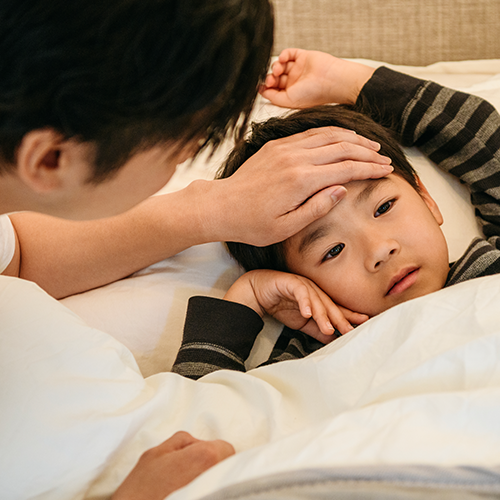Right now, more and more kids are getting sick with influenza, or the flu, and respiratory syncytial virus (RSV). While both of these illnesses are common each year, cases of both happen to be rising at the same time this year.
There are even some discussions about a ‘tridemic,’ meaning three viruses – RSV, influenza and COVID-19 – all rising at the same causing hospitals and other health care systems to be overwhelmed with sick patients.
What is RSV?
RSV is an infection that affects your lungs and breathing. For older kids, this may just feel like a common cold. However, for infants and younger children this may develop into a more severe respiratory illness. Typically, we expect RSV to last for a full week with 3-4 days of feeling the worst of the virus before improving.

Symptoms of RSV include: congestion, runny nose, decreased appetite, fever, coughing and sore throat. Signs of more serious illness include fast breathing, wheezing, difficulty breathing, lethargy and more.
Find more information on:
What is influenza?
Influenza, commonly called the flu, is an infection in the respiratory tract (your nose, throat and lungs). When you have the flu, you typically feel worse than when you have a cold. Your fever and other flu symptoms usually go away after a week or so, but your cough and muscle weakness may last longer.
Symptoms of the flu include: a fever that comes on suddenly, chills, headache, loss of appetite, muscle aches, cough, runny nose and sore throat. Vomiting and diarrhea are also both common symptoms for children.
Find more information on the flu here.
How can I help keep my kids safe?
Vaccines
Vaccinations are extremely important right now. While there is no vaccine for RSV yet, there are vaccines for the flu and for COVID-19. The experts at Children’s Minnesota highly recommend and strongly encourage getting your family vaccinated for both. Kids 6 months and older can get the flu shot and the COVID-19 vaccine. The COVID booster is available for those ages 5 and older.
While the flu vaccine is not perfect, studies show it reduces the chances of severe illness, hospitalization and death in both children and adults.
The American Academy of Pediatrics (AAP) has guidelines for well-child check-ups. During these check-ups, kids get certain immunizations based on their age. We recommend following their guidelines for your family.
Gatherings
With the weather cooling down and the winter holidays approaching, many people are gathering indoors in large groups of family members, friends and loved ones. Because of masking and social distancing during the pandemic, viruses we typically saw during an average year weren’t spreading like they normally do.
Many people are returning to pre-pandemic behaviors resulting in young children and others being more likely to catch RSV or influenza because their immune systems have not built up immunity from past season’s exposures. We recommend taking preventative strategies to help keep the viruses at bay.
Preventative strategies
Both the flu and RSV can be prevented with some of same strategies we’ve used for COVID-19: masks in public, proper hand hygiene and staying home if you’re sick.
Seeking medical care
The kid experts at Children’s Minnesota share recommendations on when and where to seek medical care if needed, plus tips for at-home care here.